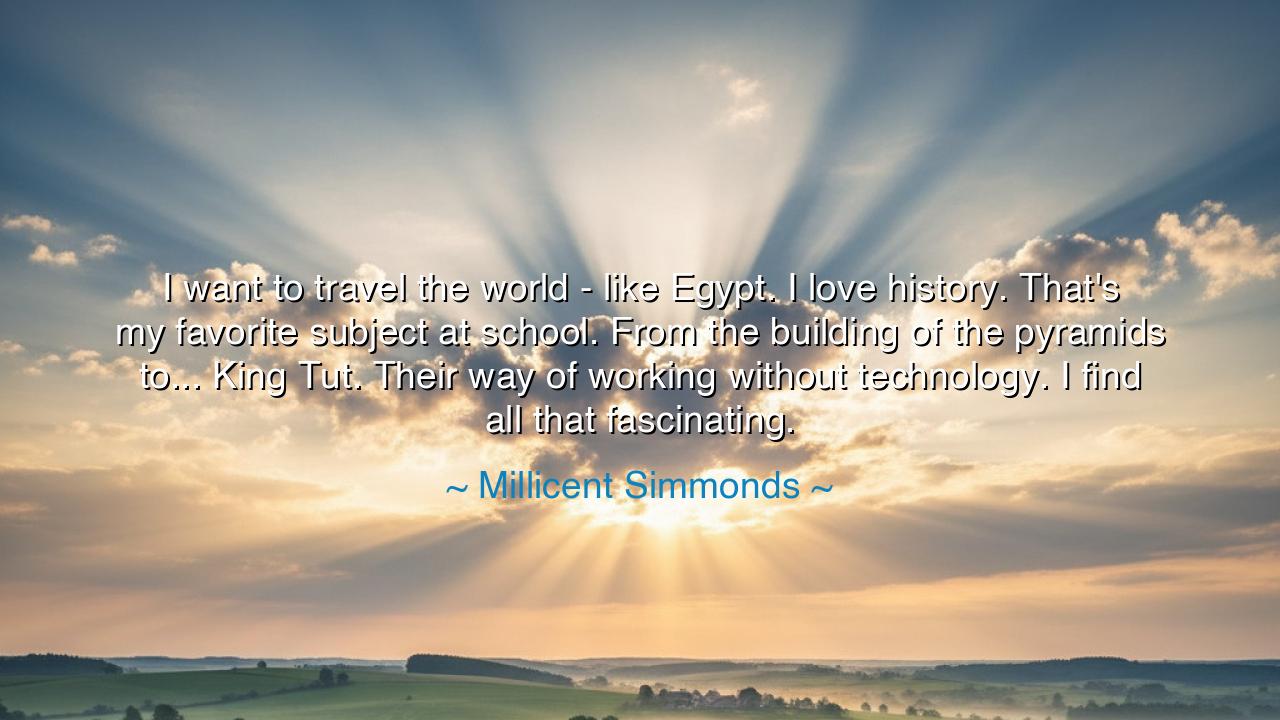
I want to travel the world - like Egypt. I love history. That's
I want to travel the world - like Egypt. I love history. That's my favorite subject at school. From the building of the pyramids to... King Tut. Their way of working without technology. I find all that fascinating.






Hear the voice of Millicent Simmonds: “I want to travel the world—like Egypt. I love history. That’s my favorite subject at school. From the building of the pyramids to… King Tut. Their way of working without technology. I find all that fascinating.” Though spoken with the wonder of youth, these words are charged with timeless wisdom. They are a reminder that the treasures of the earth are not only in gold or conquest, but in memory, in the stones of old civilizations, in the stories carved into the bones of the world.
The longing to travel the world is no idle fancy. It is the echo of humankind’s ancient thirst—to wander, to learn, to stand before monuments that whisper of lives long past. To set one’s feet in Egypt is not simply to visit a land, but to enter into dialogue with eternity. For what are the pyramids, if not mountains made by men, raised stone by stone, each block a hymn to endurance? They are proof that greatness may be achieved not by fleeting machines but by the strength of will, by the unity of vision, by hands joined across generations.
Consider the laborers of the Nile who, without the engines of technology, lifted these stones that still defy the ages. They did not have the machines of iron or the computers of today, yet they built something that outlives both empire and emperor. This is the wonder that Millicent Simmonds calls “fascinating”—that human beings, with courage and patience, could create works that stand against time itself. The pyramids are more than tombs; they are eternal teachers, declaring that the limits of flesh can be transcended by spirit.
And who does not marvel at the boy-king, King Tutankhamun, whose resting place, hidden for millennia, was unveiled in the modern age? The treasures buried with him were not merely ornaments; they were symbols of a civilization that saw life and death as one seamless journey. To gaze upon his golden mask is to feel the pulse of history, to sense that we too are part of a continuum, that we stand in a chain stretching backward into mystery and forward into destiny. History is not dead—it lives in us, as long as we remember.
Millicent’s admiration for a world without technology is not rejection of the modern, but reverence for the ancient spirit. For there is wisdom in seeing how our ancestors thrived without the devices we now cling to. They measured stars without telescopes, healed with herbs before laboratories, and built with faith before blueprints. To study them is to remember that the human mind and hand are still capable of miracles without the aid of machines. And when we forget this, we become smaller than they.
The lesson here is clear: honor the past, and let its wonder guide the present. Do not think of the ancients as primitive; think of them as teachers who show us that perseverance, imagination, and unity can achieve what even modern tools struggle to accomplish. In your own life, look upon challenges not as impossibilities but as pyramids waiting to be built. Do not say, “I lack the tools.” Instead, say, “I will find the way.” The ancients remind us that greatness is born not of convenience but of vision.
So, O seeker, take this teaching to heart: make time to study history, to walk among the ruins, to hear the silent voices of the stones. Let the travels of your mind and body awaken in you the awe of human potential. When you face your own burdens, remember the workers of Egypt, who raised the pyramids block by block under the blazing sun. And when you feel your efforts are small, remember that even the grandest monument is built from countless humble hands.
Thus, let your life be a journey like Millicent dreams: a journey into the past to draw strength for the future. For though technology may shape our age, it is the enduring flame of human spirit—our curiosity, our endurance, our love of history—that truly builds the monuments of eternity.






AAdministratorAdministrator
Welcome, honored guests. Please leave a comment, we will respond soon